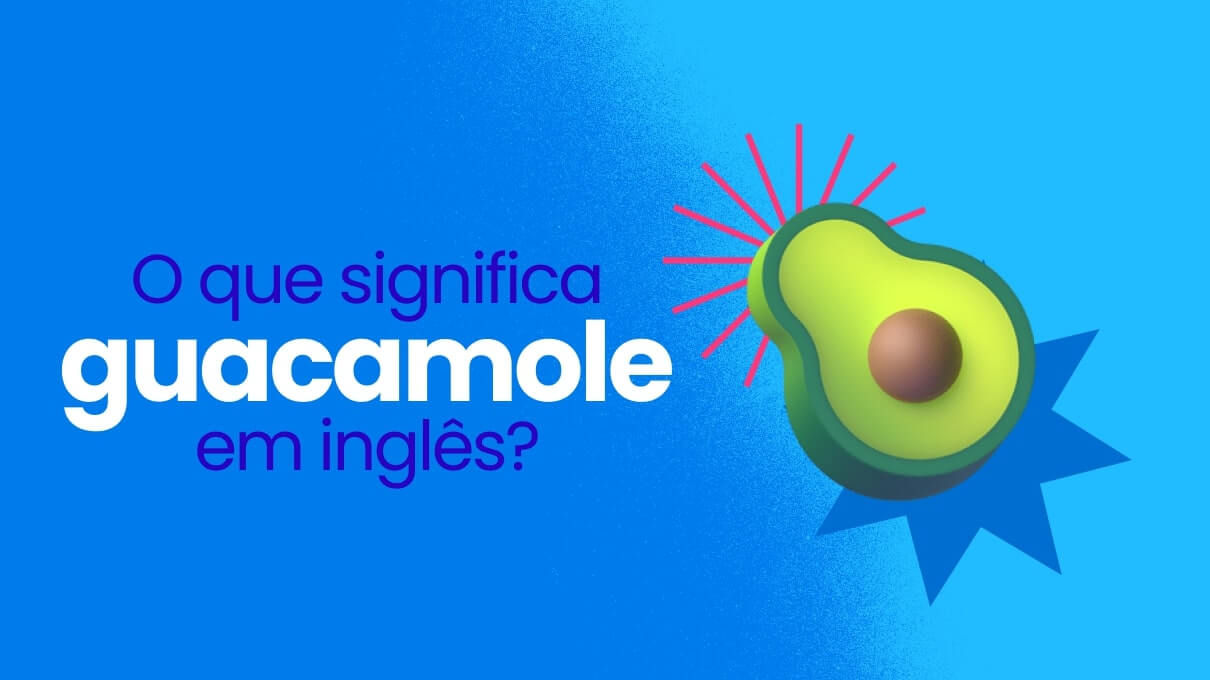Fluency News #11

Hello, everyone! Sejam bem-vindos e bem-vindas a mais um episódio da nossa nova série de podcasts, o Fluency News! Aqui, você vai treinar a sua escuta e ficar por dentro do que está acontecendo no mundo, sempre com as três principais notícias da semana, tudo em inglês! Ao longo do episódio, nós também adicionamos explicações […]
Hello, everyone!
Sejam bem-vindos e bem-vindas a mais um episódio da nossa nova série de podcasts, o Fluency News! Aqui, você vai treinar a sua escuta e ficar por dentro do que está acontecendo no mundo, sempre com as três principais notícias da semana, tudo em inglês! Ao longo do episódio, nós também adicionamos explicações em português das coisas que achamos que precisam de mais atenção, assim você não perde nenhum detalhe!
No episódio desta semana, falamos sobre a controvérsia a respeito da pesca de lagostas na Nova Escócia, a morte de um trabalhador de zoológico em frente a turistas, e sobre a economia chinesa, que está se estabilizando à medida que a Covid-19 é controlada no país.
Nós temos uma nova página de dicas de inglês no Instagram, vá conferir! @fluencytvingles
Toda semana temos um novo episódio do Fluency News, não deixe de escutar! See you!
SOURCES:
Indigenous leader demands protection after lobster pound blaze: https://www.aljazeera.com/news/2020/10/17/indigenous-leader-demands-protection-after-lobster-pound-blaze
Canada: Indigenous fishers urge gov’t action after violent raids:
https://www.aljazeera.com/news/2020/10/15/canada-indigenous-fishers-urge-govt-action-after-violent-raids
https://www.bbc.com/news/world-us-canada-54472604
Shanghai zoo fatal bear attack: Visitors see worker being killed: https://www.bbc.com/news/world-asia-china-54596717
https://www.newsweek.com/china-zookeeper-fatal-bear-attack-shanghai-1540194
China’s economy accelerates as virus recovery gains strength: https://abcnews.go.com/International/wireStory/chinas-economy-accelerates-virus-recovery-gains-strength-73687827
https://www.bbc.com/news/business-54594877
https://www.nytimes.com/2020/10/18/business/china-economy-covid.html?referringSource=articleShare
‘I never saw stars before’: Gene therapy brings back 8-year-old Canadian boy’s sight:
https://www.ctvnews.ca/mobile/health/i-never-saw-stars-before-gene-therapy-brings-back-8-year-old-canadian-boy-s-sight-1.5145830
TRANSCRIPT
What is up, guys! I’m Scott Lowe and welcome back to Fluency News, the Fluency Academy podcast that keeps you informed while you train your listening skills.
How cool is that? After each story, you’ll hear some snippets of explanations in Portuguese, on what we feel needs a little bit more attention. You can find the sources to all the stories in the description, as well as a transcript of the episode, so you can read while listening, if you want. As always, I’ll share three of the most important or controversial stories of the week, and we’ll always finish the episode with some good news, to warm our little hearts in this time of trouble.
Now let’s jump into it! A fight over indigenous fishing rights that’s been decades in the making has come to a head in Nova Scotia, the epicenter of Canada’s billion-dollar lobster industry. Canada is usually known for being home to the nicest people, and for being a peaceful country. That’s totally true, that’s exactly how other North Americans, that’s how we view Canada. ̣̣But what’s been happening there has been nothing short of horrible.
In a small warehouse on the southern tip of Nova Scotia, near Yarmouth, two indigenous fishermen found themselves trapped with nowhere to go when an angry mob raided the lobster pound where they had stored their catch. Jason Marr, one of the indigenous fishermen stuck inside, said he had moved his lobster there that evening because he heard there might be a raid at another location. All was quiet at first, but soon he says he was surrounded by about 200 men.
“They were pounding on the door, screaming obscenities, ‘give us the lobster’!” he told the BBC. There were also four non-indigenous men inside with them, who worked at the pound. The crowd cut the power and threw a rock through the window, while he called police, he says. Mr. Marr says he saw men urinate on his car and slash his tires. Ah man, that’s too low. Violence against a man’s car… Leave the car out of it! A few hours earlier, a similar raid had been carried out at a lobster pound near New Edinburgh, where a car was burned. Again, with the car violence? Come on, guys! “I didn’t know if they wanted to kill me or whatnot… they said they were going to give us until midnight, or they were going to burn us out,” Mr Marr said.
The standoff ended when police forced him to leave, he says, and he watched as the men stormed the pound and took his catch, as well as others. Days later, early Saturday morning, the lobster pound burned to the ground in what police are calling a “suspicious” fire. Ah yes, I’ll say. That sounds very suspicious, Canadian police. Mr Marr accused police of standing by and letting the mob take his lobster. In both raids, police gathered outside but made no arrests on site. The Royal Canadian Mounted Police charged one man on Sunday with burning a car at the lobster pound near New Edinburgh. Dude, again, with the car defacing. It’s gone too far. If someone did that to my car, I don’t know what I would do. Federal Public Safety Minister Bill Blair said more police officers would be sent to the area to “maintain the peace”.
This mayhem is the latest in an escalating feud between Mi’kmaq fishermen and non-indigenous commercial fishermen that began when the Sipekne’katik First Nation launched its own fishery in September, during the off-season. And, fair warning, there are going to be a few indigenous names here, that I will no doubt butcher. So far I think I’m doing ok. I looked up the pronunciation of Mi’kmaq and Sipekne’katik, so wish me luck.Non-indigenous commercial fishermen say the fishery should be shut down, while indigenous fishermen say it is their constitutional right.
The roots of this discord go back over 250 years to the Peace and Friendship Treaty of 1752. That is the most Canadian name of a document I’ve ever heard. The Peace and Friendship Treaty, so cute. Anyway, that promised Mi’kmaq the right to hunt and fish their lands and establish trade. For centuries, the treaty and others like it were ignored. Operating outside of the province’s commercial lobster fishery, the Sipekne’katik First Nation plans to make their lobster fishery a test case, issuing just 11 licenses, with the hopes of collecting data towards making the operation sustainable in the years to come. “It wasn’t like we just came down and put traps in the water,” Chief Michael Sack told the BBC. But Mr. Sack says that shortly after launching the fishery, they became subject to threats and sabotage, which culminated in the raids on two lobster pounds this week. Mr Sack was assaulted last week and a man has been arrested. Derek Thomas, a commercial fisherman for over 25 years, condemns the violence. But he says the government needs to step in and enforce off-season rules for the sake of the lobster population.
“I don’t think anybody likes the violence, and I don’t think anybody denies their rights. But enough is enough already,” he told the BBC. “Regulations are designed to prevent over-harvesting and to maintain a sustainable fishery, it is all we want for our communities.” I don’t know, I think a fisherman just sounds like that. Just a guess. The government does have the right to regulate indigenous fishing in order to protect conservation efforts. But the Supreme Court ruling in the R v Marshall case made it clear that the government must prove the restrictions are necessary. In Canada, the Department of Fisheries and Oceans (DFO) only allows lobster fishing during distinct seasons, timed to coordinate with the lobster’s molting schedules, which is when lobsters shed their shell and grow another one. During the molting, their shells are soft, and they are easily hurt and killed. But restricting lobster fishing during molting season is not the only way to protect the lobster population, says Robert Steneck, a professor of oceanography who researches lobster populations at the University of Maine’s School of Marine Sciences. “Frankly I don’t think it really makes a difference,” he says. The scale of the fishery matters, Mr. Steneck says, and the impact that a small fishery like the one organized by the Sipekne’katik First Nation would have limited effect on total populations.
In LFA 34, the regulatory name for the body of water near St Mary’s Bay, where the indigenous lobster fishery is located, there are 979 lobster licenses, and each license is allowed to carry about 375-400 traps during the season. The Sipekne’katik fishery has issued 11 licenses, with the right to carry 50 traps each. “Really it would be trivial, in my view, by almost any standard,” he says. Canada is the largest supplier of lobsters in the world, and Nova Scotia is responsible for harvesting about half of the country’s C$1.4bn of lobster. (approximately R$6bn). The non-indigenous fishing industry has been a vital part of the province’s economy since it was settled by British and French colonialists in the 1600s. But the Mi’kmaw have been fishing the region’s waters for centuries before.
“We are so deeply connected to the land, the river, the water, the resources. It’s not just how we survive; it becomes who we are,” says Cheryl Maloney, an activist and political science professor at the University of Cape Breton who is the daughter of former chief Reginald Maloney. Before his death in 2014, her father fought for the community’s fishing rights and witnessed the upheaval after R v Marshall. Meanwhile, DFO continues to fine or arrest indigenous fishermen for fishing in the off-season. “Prosecuting people and letting non-indigenous people cut traps and destroy boats – I don’t think is a very effective way of addressing the situation,” Ms Metallic, a law professor at Dalhousie University says. If there’s one thing both sides can agree on, it’s that DFO is failing at its job. The commercial fishers believe DFO has the right to stop fishing in the off-season to protect the lobster stock. The Mi’kmaw believe the government needs to protect their rights and stop the commercial fishermen from sabotaging their traps. And for the love of God, stop lighting their cars on fire. DFO says it is currently in talks with Sipekne’katik First Nation to come to an agreement over the fishery.
“As discussions are ongoing, no further details can be offered at this time,” a spokesperson for the DFO told the BBC in a statement. I don’t know, I ran out of voices, so I just made that last one up, completely.
Você já deve ter percebido que em notícias e artigos mais formais é muito comum que a “ordem padrão” das frases do inglês seja mudada. Não dizemos sempre o sujeito, e depois o verbo principal e depois o complemento — como o “quando” aquela ação aconteceu, o “onde” e assim por diante. Esse é também um dos motivos pelos quais esses gêneros textuais pedem que tenhamos um nível de compreensão do idioma maior, porque a nossa mente precisa guardar muitas informações para então juntá-las no final, e assim o parágrafo, o texto, fazer sentido. Vou te dar um exemplo! Preste atenção neste parágrafo da notícia que acabamos de ouvir:
“In a small warehouse on the southern tip of Nova Scotia, near Yarmouth, two indigenous fishermen found themselves trapped with nowhere to go when an angry mob raided the lobster pound where they had stored their catch.”
Quais são as informações mais importantes aqui? O “quem” e o “o que” que aconteceu, ou seja, “two indigenous fishermen found themselves trapped”. As outras informações são adicionais. Por exemplo, as primeiras 13 palavras na verdade falam sobre o “onde” tudo isso aconteceu.
Our next story comes from China, where a zookeeper has been killed by a group of bears at a wild animal park.
The Shanghai Wildlife Park confirmed that a staff member was attacked on Saturday afternoon while working in the “wild area” where dangerous animals such as bears and tigers roam around relatively freely. Park visitors on a tour bus in that section of the park saw the bears run towards the staffer and filmed parts of the tragedy as it unfolded. Chinese state-owned tabloid Global Times reported that an excavator working nearby drove towards the animals in an attempt to move the bears and save the person, but it was too late. The video has since been widely shared on Chinese social media network Weibo, and watched more than 658,000 times within the last 18 hours. Wow, that’s pretty dark. Definitely not a video that I will be looking up. The video has generated plenty of discussion about the safety protocols of the park and questioned how the bears were able to get close to the worker. The park released a statement saying they are investigating the matter, and have since closed their dangerous wild animal section.
“Our park is extremely saddened by such a tragedy, expressing deep condolences to the deceased, expressing deep sympathy to the families of the deceased and apologising for the inconvenience it caused to tourists,” a statement by the park said. “At present, our park is actively cooperating with relevant departments to conduct an incident investigation.” The Chinese animal park has promised to improve safety. It is rare for zoo workers in China to be mauled to death by animals, but attacks are not entirely uncommon – although in most of these cases, these accidents are allegedly brought on by the visitors themselves. In 2017, a man was bitten by a bear in a drive-through wildlife park in China after he ignored park warnings and rolled down his window to feed the bear. I mean, that’s very sad, but that’s what happens when you feed a bear.
Um tipo de palavrinha muito importante para a fluência avançada em inglês, e que às vezes não damos tanta atenção assim, são os advérbios de intensidade e modo. Exemplos deles que encontramos nesta notícia são: entirely, extremely, relatively, widely, actively, allegedly, entre outros. Eles podem parecer “dispensáveis”, porque apenas “intensificam” uma informação ou explicam o “modo” como uma ação foi realizada. Por exemplo, na frase “Our park is extremely saddened by such a tragedy”, poderíamos deixar o “extremely” de fora, mas o sentido não seria tão intenso quanto quando temos ele na frase.
Our final story of the day comes as China’s economy surges ahead with Covid-19 under control.
Exports jumped and local governments engaged in a binge of debt-fueled construction projects. Even consumer spending is finally recovering. As most of the world still struggles with the coronavirus pandemic, China is showing once again that a fast economic rebound is possible when the virus is brought firmly under control. The Chinese economy surged 4.9 percent in the July-to-September quarter compared with the same months last year, the country’s National Bureau of Statistics announced on Monday. The robust performance brings China almost back up to the roughly 6 percent pace of growth that it was reporting before the pandemic. Many of the world’s major economies have climbed quickly out of the depths of a contraction last spring, when shutdowns caused output to fall steeply. But China is the first to report growth that significantly surpasses where it was at this time last year. The United States and other nations are expected to report a third-quarter surge too, but they are still behind or just catching up to pre-pandemic levels.
China’s lead could widen further in the months to come. It has almost no local transmission of the virus now, while the United States and Europe face another accelerating wave of cases. The vigorous expansion of the Chinese economy means that it is set to dominate global growth — accounting for at least 30 percent of the world’s economic growth this year and in the years to come, Justin Lin Yifu, a cabinet adviser and honorary dean of the National School of Development at Peking University, said at a recent government news conference in Beijing. Chinese companies are making up a greater share of the world’s exports, manufacturing consumer electronics, personal protection equipment and other goods in high demand during the pandemic. At the same time, China is now buying more iron ore from Brazil, more corn and pork from the United States and more palm oil from Malaysia. That has partly reversed a nosedive in commodity prices last spring and softened the impact of the pandemic on some industries.
Still, China’s recovery has done less to help the rest of the world than in the past because its imports have not increased nearly as much as its exports. This pattern has created jobs in China but placed a brake on growth elsewhere. China’s economic recovery has also been dependent for months on huge investments in highways, high-speed train lines and other infrastructure. And in recent weeks, the country has seen the beginning of a recovery in domestic consumption. The affluent and people living in export-oriented coastal provinces were the first to start spending money again. But activity is resuming now even in places like Wuhan, the central Chinese city where the new coronavirus first emerged. China’s model for restoring growth may be effective, but may not be appealing to other countries. Determined to keep local transmission of the virus at or near zero, China has resorted to comprehensive cellphone tracking of its population, weeks long lockdowns of neighborhoods and cities and costly mass testing in response to even the smallest outbreaks.
China’s leaders recognize that the country’s exports are increasingly vulnerable to geopolitical tensions, including the Trump administration’s moves to unwind trade relations between the United States and China. Shifts in global demand might also threaten exports, as the pandemic batters overseas economies.
“On the whole, China’s economy was primarily driven by domestic demand,” Liu Aihua, a spokeswoman for the National Bureau of Statistics, said at a news conference in Beijing. Michael Pettis, a finance professor at Peking University, said that as people in other countries supported by government subsidies continue to turn to China for products during the pandemic, “we’re going to see a resurgence of trade conflict, and not just U.S.-China, but global.”
Claro que é sempre interessante conhecer mais algumas palavras e frases que podem conectar parágrafos e ideias na notícia. Aqui temos três exemplos legais. O primeiro deles, “at the same time”, que usamos para mostrar que algo está acontecendo no mesmo período ou com a mesma importância do que falamos anteriormente. Outra palavra é o “still”, que tem muitos sentidos, mas foi usado aqui com o mesmo sentido de “ainda assim”. E o terceiro é “on the whole”, que usamos para generalizar, com o mesmo sentido de “no geral”.
As promised, let’s end this episode with some good news! For the thousands of Canadians at risk of blindness, eight-year-old Sam is a beacon of hope. Alright, more Canadian news, I love it! He is the first Canadian to be treated with gene replacement therapy for a rare form of blindness which had left Sam unable to see sky on a cloudy day, and unable to make out shapes in the dark.
“Sometimes you have to walk in the night and I couldn’t see things and you bump into things,” Sam told CTV News. By the way, that’s my “little kid’s” voice.
He had to have lights on always, and had trouble seeing his shoes or objects on the floor. And the condition was progressive, meaning things would get worse as he grew older — a daunting prospect when there was no treatment available. But now he can see cloudy skies, shoes and more. The best part of his improved vision, says Sam, are the stars at night. “I never saw stars before,” he said. “And I also never saw airplanes flying at night.” He was diagnosed after birth with a genetic disorder called retinitis pigmentosa, a form of genetic retinal degeneration resulting from mutations in the RPE65 gene.
“You lose perception of light,” Dr. Elise Heon, of Sick Kids Hospital, explained to CTV News. “You end up in darkness and [it’s] slowly progressive, it’s relentless, your visual field shrinks and shrinks and shrinks and shrinks.” Now, Canada has approved the first-ever gene replacement therapy for this form of blindness. Sick Kids Hospital has 29 children in its program with this mutation. The drug can be used on children and adults with the condition, but the earlier it’s used, the more sight it will save, doctors believe. “It’s a huge deal, because for these patients before, there’s no treatments,” Heon said. She said she had recently met two patients, brothers, who were suffering the same problem as Sam, and for the first time, she was able to provide hope.
“They’re 10 years old, and they’re losing their vision,” she said. “If we do nothing, they’re just going, fine, they’ll just end up with no light reception. So for the first time [we were] able to say, well, actually we need to have a discussion. And it was just, it was priceless.” The gene therapy, which goes by the brand name Luxturna, was developed in the U.S by the drug company Spark Therapeutics. It works by placing a copy of the healthy gene into inactivated viruses, which are then injected into the retina. The gene then allows cells to produce the necessary protein to convert light into an electrical signal in the retina in order to provide healthy vision and prevent progression of the disease. It is the first targeted gene therapy to be approved by Health Canada, which gave it the all-clear this week.
With the approval of this gene therapy in Canada, doctors are hoping to be able to use it on more patients who qualify — and the earlier the better.
Dr. Peter Kertes, a vitreo-retinal surgeon and Ophthalmologist-in-Chief at Sunnybrook Health Sciences Centre, told CTV News that the approval of the therapy is “fantastic.” “This is a huge breakthrough,” he said. “Most of the advances that we have in medicine are incremental. Every once in a while, once in a generation, something revolutionary like this comes along that really changes the course of therapy.” This may be just one gene therapy for one condition, but it will open to the door to this strategy being used in other scenarios, Kertes pointed out.
“This is the tip of the iceberg. I think this is a vector that will prove to be very effective and holds great promise,” he said. “I think many people who are living with blindness or facing blindness, have much to look forward to. I think we’re on the cusp of a revolution in this group of diseases.” The company licensing the therapy, Novartis Pharmaceuticals Canada Inc., isn’t detailing the cost, but based on the price in the U.S it could top $1.1 million in Canada, making it among the most expensive drugs in the country. The therapy is currently under review by both the Canadian Agency for Drugs and Technologies in Health (CADTH) and the INESSS (Institut national d’excellence en santé et en services sociaux), which is actually a French names I’m not going to embarrass myself by trying to pronounce.
As this will likely be the first of many gene replacement therapies — with similarly high price tags — Ottawa and the provinces will have to make the decision on whether it will be covered by provincial health plans. The question is an ongoing ethical debate, with some saying that drug companies will only take advantage of it if governments show that they are willing to pay.
“Should it be the responsibility for the government to pay for any drug at any price?” Marc-André Gagnon, a researcher with Carleton University who looks into pharmaceutical policy, told CTV News. “The problem is, if we say yes to this question, you can be sure that the day after, all the drugs in the market will be asking for much higher prices.” Sorry, guys. That’s my best French accent. I don’t think it’s that bad, though. “It’s a very expensive drug,” Heon acknowledged. However, she pointed out that this is a rare disease, and it’s “not a recurrent treatment.” It’s a one-time injection to the eyes. “You treat both eyes and then that’s it,” she said.
“To be able to change someone’s life is quite a privilege. And to be able to prevent someone from going blind is a real privilege.” For Sam and his mother, the gift of independence has been priceless. “This is a story of hope,” his mother said. “A child told ‘it is what it is.’” And now, when he looks up at night, he can see stars.
Essa notícia, além de ser muito animadora, é também bem interessante no uso da linguagem. Se você reparar, as entrevistas foram feitas com uma criança e com médicos, certo? Por não se tratar de uma entrevista muito formal, eles tem a liberdade de usar uma linguagem um pouco mais informal e espontânea. Podemos perceber isso quando o garoto usa a palavra “you” como usamos “você” de forma genérica, sem ser diretamente sobre com quem estamos falando, na frase: “Sometimes you have to walk in the night and I couldn’t see things and you bump into things”. Outro exemplo é quando a Dr. Heon fala “And it was just, it was priceless.” Você percebeu que ela não terminou a primeira frase? Isso é muito comum quando estamos falando com empolgação, pois nossas ideias mudam rapidamente e vamos ajustando o que queremos dizer com o que estamos sentindo e pensando.
Wow, I can only imagine how amazing it must feel seeing the stars for the very first time. Let’s hope that more kids have the same chance in the future. And that’s where we end today’s episode. Make sure to visit fluencytv.com for over 600 free lessons in five different languages. And you can also check our Instagram page, @fluencytvingles. There’s a new episode of Fluency News every single week, and we’ll be here waiting for you. Peace out.
Playlist




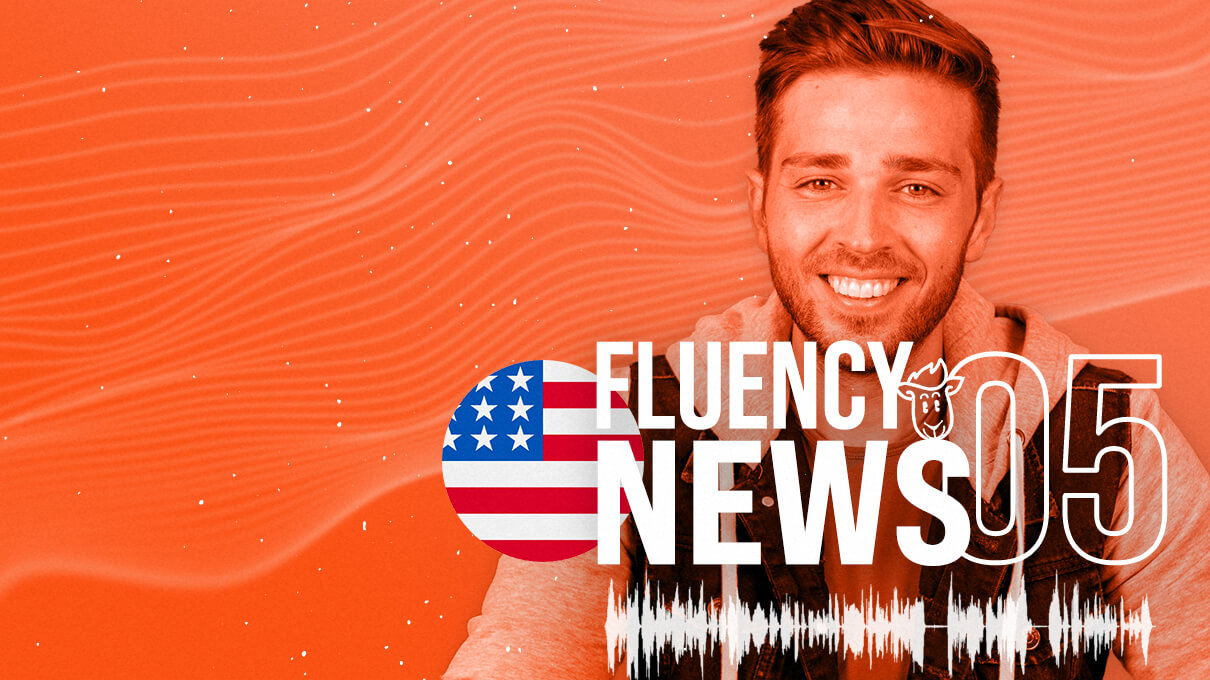






























































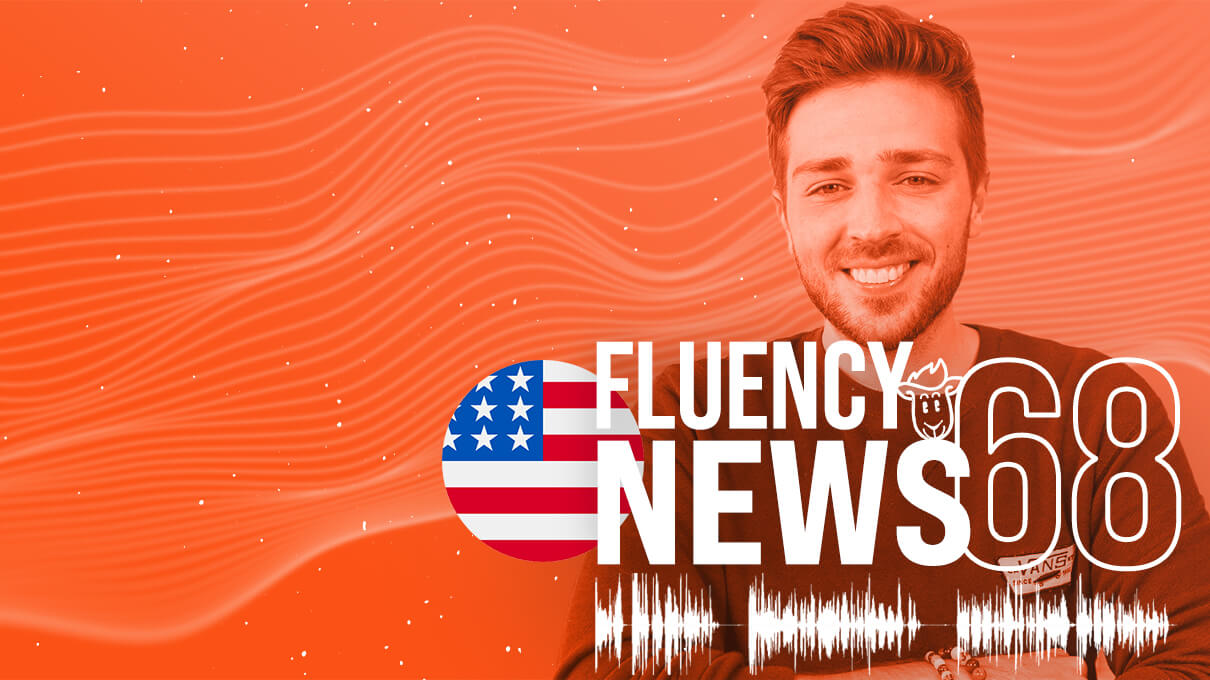











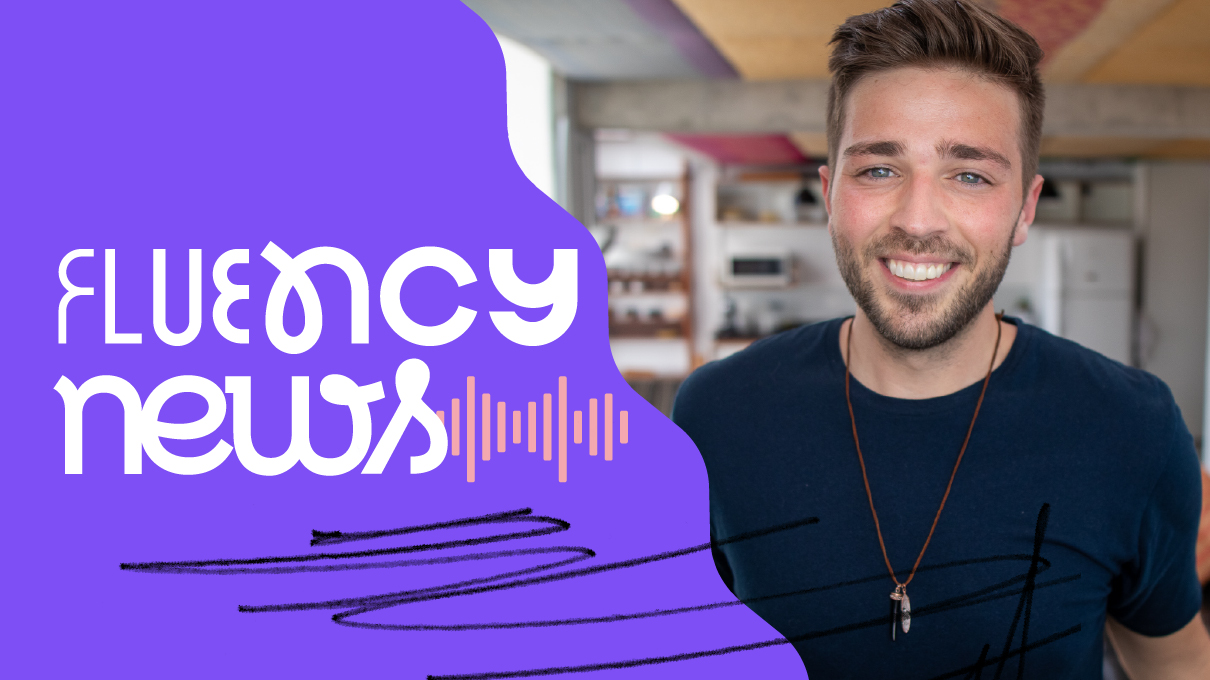

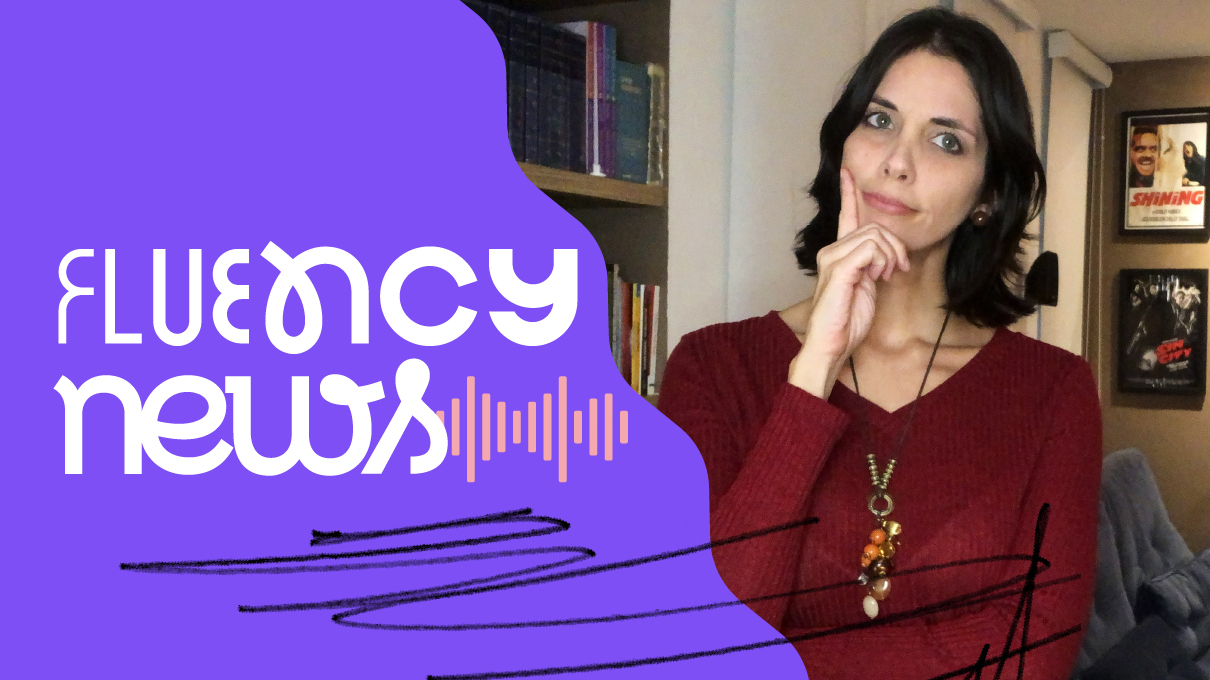





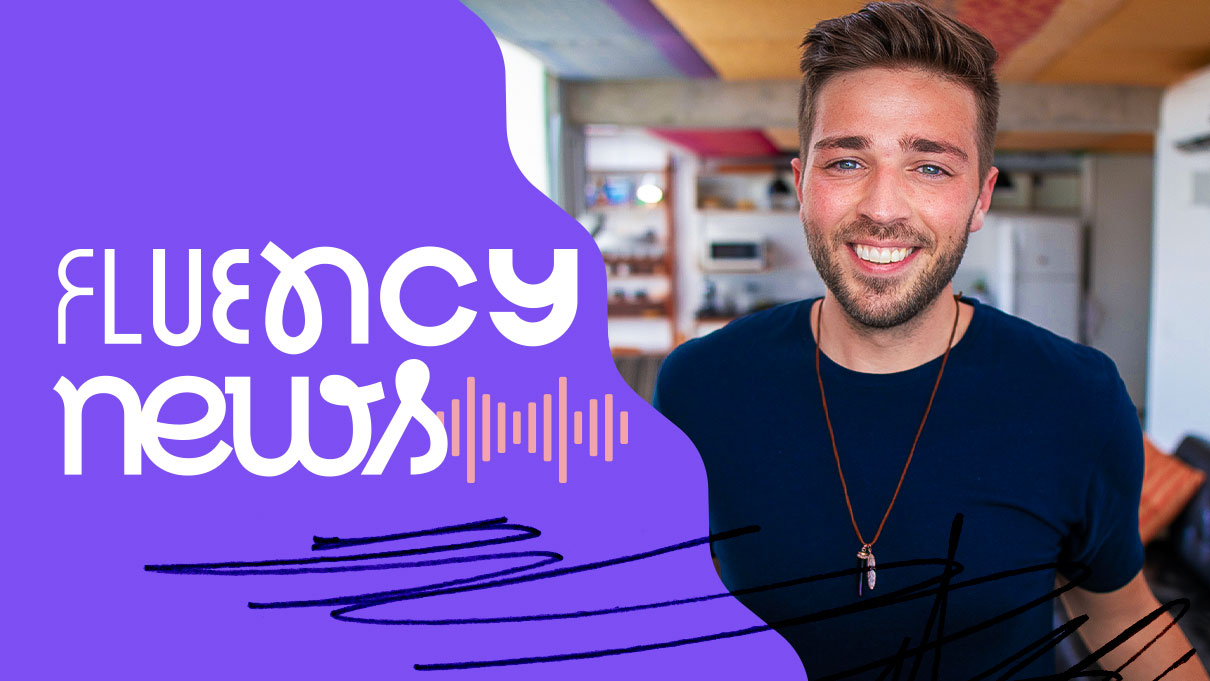








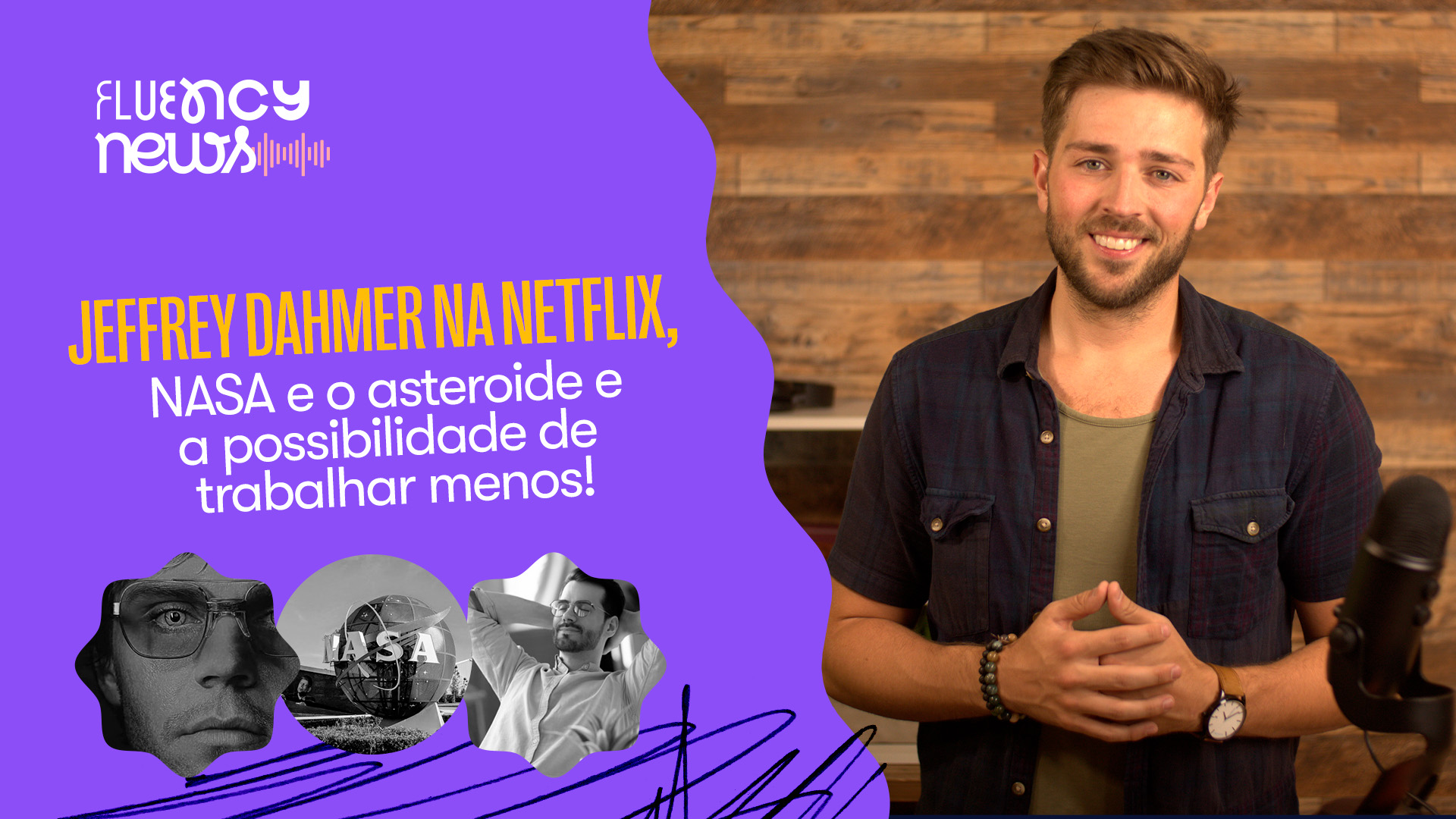



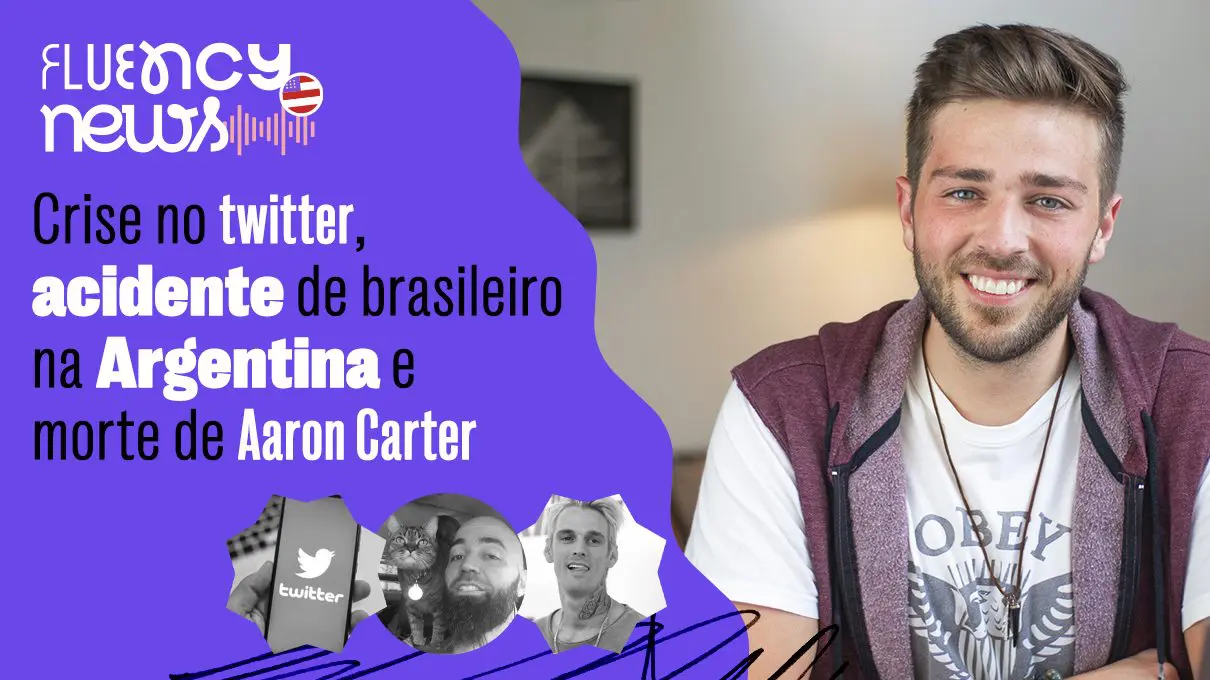
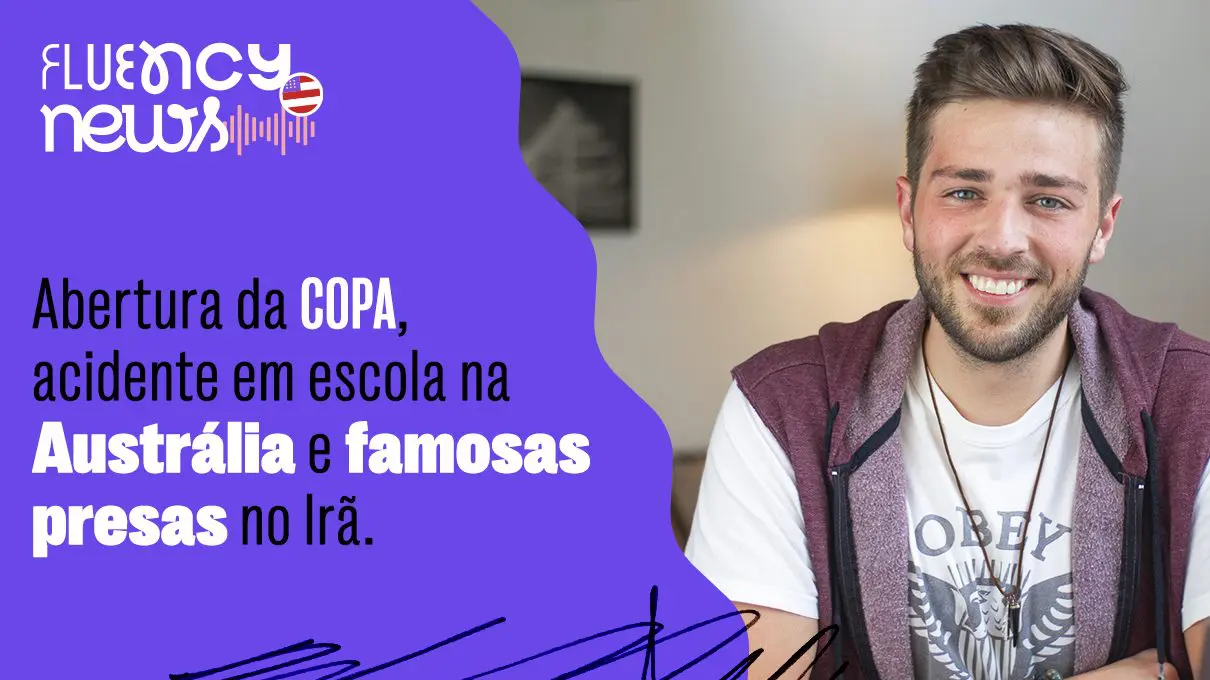


 Inglês
Inglês Espanhol
Espanhol Mandarim
Mandarim Coreano
Coreano Japonês
Japonês Alemão
Alemão Italiano
Italiano Francês
Francês




























